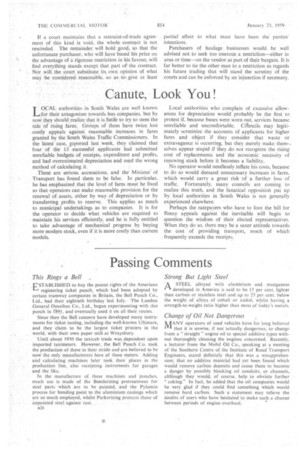Canute, Look You !
Page 30

If you've noticed an error in this article please click here to report it so we can fix it.
LOCAL authorities in South Wales are well known for their antagonism towards bus companies, but by now they should realize that it is futile to try to stem the tide of rising fares. Groups of them have twice lost costly appeals against reasonable increases in fares granted by the South Wales Traffic Commissioners. In the latest case, reported last week, they claimed that four of the 13 successful applicants had submitted unreliable budgets of receipts, expenditure and profits, and had overestimated depreciation and used the wrong method of calculating it.
These are serious accusations, and the Minister' of Transport has found them to be false. In particular, he has emphasized that the level of fares must be fixed so that operators can make reasonable provision for the renewal of assets, either by way of depreciation or by transferring profits to reserve. This applies as much to municipal undertakings as to companies. It is for the operator to decide what vehicles are required to maintain his services efficiently, and he is fully entitled to take advantage of mechanical progress by buying more modern stock, even if it is more costly than current models. Local authorities who complain of excessive allowances for depreciation would probably be the first to protest if, because buses were worn out, services became unreliable and uncomfortable. Clincils may legitimately scrutinize the accounts of applicants for higher fares and object if they consider that waste or extravagance is occurring, but they merely make them-. selves appear stupid if they do not recognize the rising cost of replacements and the economic necessity of renewing stock before it becomes a liability.
No operator would needlessly inflate his costs, because to do so would demand unnecessary increases in fares, which would carry a great risk of a further loss of traffic. Fortunately, many councils are coming to realize this truth, and the fanatical oppositioh put up by local authorities in South Wales is not generally experienced elsewhere.
Perhaps the ratepayers who have to foot the bill for flimsy appeals against the inevitable will begin to question the wisdom of their elected representatives. When they do so, there may be a saner attitude towards the cost of providing transport, much of which frequently exceeds the receipts.




































































































































































































